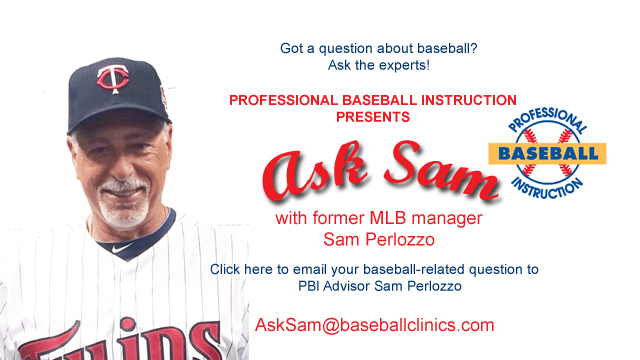
Welcome to the latest “Ask Sam.”
I’m Sam Perlozzo and I’m the minor league infield and baserunning coordinator for the Minnesota Twins. A former manager and coach at the major league level, I am also one of Professional Baseball Instruction’s Major League Advisors. Each month, I answer your baseball-related questions.
 Before we get into this month’s questions, I want to remind you about something brand new that I’m involved in and very excited about. Fellow PBI Advisor Leo Mazzone and I have teamed up with former MLB players Roy Halladay, Dave Magadan, Jody Reed, Tom Foley and others on a new website called Inside Baseball. We offer the world’s largest online library of baseball training videos with proven advice and training methods designed to help baseball players of all abilities improve their game. I hope you’ll take a few moments to check out the website; there’s a lot of excellent information there.
Before we get into this month’s questions, I want to remind you about something brand new that I’m involved in and very excited about. Fellow PBI Advisor Leo Mazzone and I have teamed up with former MLB players Roy Halladay, Dave Magadan, Jody Reed, Tom Foley and others on a new website called Inside Baseball. We offer the world’s largest online library of baseball training videos with proven advice and training methods designed to help baseball players of all abilities improve their game. I hope you’ll take a few moments to check out the website; there’s a lot of excellent information there.
Now, let’s get to your questions. And remember, if you have something you’d like to ask? Email me directly – AskSam@baseballclinics.com.
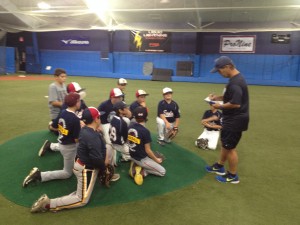 Q: Hi, Sam. I am very much in need of help here. I have never coached before and today is the first practice for my team, which is a 9 and 10 year old team. This is the first year for the kids to be pitching to each other and I need some suggestions on what to focus on in practices. Also, how do I go about finding positions for the players? Thank you, Travis Ewing
Q: Hi, Sam. I am very much in need of help here. I have never coached before and today is the first practice for my team, which is a 9 and 10 year old team. This is the first year for the kids to be pitching to each other and I need some suggestions on what to focus on in practices. Also, how do I go about finding positions for the players? Thank you, Travis Ewing
A: Travis, in answer to your first question about your players throwing to each other, my suggestion is to tell them to “throw strikes and let your teammates hit the ball.” This is merely an arm exercise and they are probably not ready for all-out throwing. Give them a chance to get conditioned before you start and get them strong enough where they are actually trying to get opposing hitters out. Let their arms get into shape, then they can work on other ways to get hitters out.
As far as finding positions, let them go to a position they like first. Watch them practice, and you should be able to decide whether that position is the right fit for that kid. For example, if a kid comes to the infield, but is afraid of a ground ball, then try him in the outfield. Kids who have good arms can be catchers, pitchers or positions that require more arm strength. It’s really just common sense. Don’t panic, let the practice go on, take notes, and eventually when a child doesn’t do well at a certain spot they will come to you and asked to be moved.
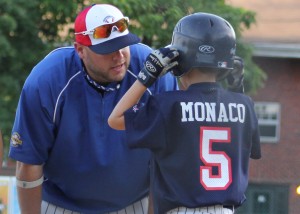 And Travis, as far as setting up practice, it’s always easier to have stations so the kids can stay active. I am assuming you have some assistant coaches to help out. That way they can go to a hitting station, fielding, throwing, etc. If you are by yourself, then you are a saint!! Only kidding, but that is really hard for young kids. Their attention spans are shorter so the practice should be snappy and moved along. Hope this helps. I think you probably have this figured out by now but best of luck and thanks for writing. Sam
And Travis, as far as setting up practice, it’s always easier to have stations so the kids can stay active. I am assuming you have some assistant coaches to help out. That way they can go to a hitting station, fielding, throwing, etc. If you are by yourself, then you are a saint!! Only kidding, but that is really hard for young kids. Their attention spans are shorter so the practice should be snappy and moved along. Hope this helps. I think you probably have this figured out by now but best of luck and thanks for writing. Sam
Q: Sam, I have a couple of rules-related questions for you- can a coach pick up a player when he falls down rounding third? Is it a balk when a pitcher drops the ball standing with one foot in the hold in front of the mound and one in back? In a run-down going from second to third is there a out of bounds lines? Thanks, Michael Cooper
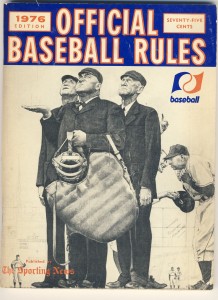 A: Michael, I am glad you asked the rule questions. I am presently in instructional league with the Twins and we had rules day today!! Reading the rule book will make you think you are a dummy. So many interpretations make it a real challenge. It is a great idea to bring a rule to practice each time just so that not only do the kids get a chance to learn them but also the coaches.
A: Michael, I am glad you asked the rule questions. I am presently in instructional league with the Twins and we had rules day today!! Reading the rule book will make you think you are a dummy. So many interpretations make it a real challenge. It is a great idea to bring a rule to practice each time just so that not only do the kids get a chance to learn them but also the coaches.
Number one, a coach cannot help a runner on the field. That would be interference. Now a runner can run into you while rounding third and get up and not be called out. But if you physically help him that would cause the runner to be out. I’ve actually seen third base coaches get run over several times!! Fortunately after coaching third for 17 years in the major leagues, it did not happen to me, but close a few times!!
Number two, it is a balk if the pitcher drops the ball if his foot is on the rubber or in the hole considered the rubber. If neither foot is on the pitching plate, you can do almost anything and not be a balk.
Number three, there is a running lane that is considered “in bounds”, at the discretion of the umpire. There is a certain amount of space you are allowed to run before you are called out for “running out of the baseline.” Usually if you are within reach of the fielder, you will still be considered in the baseline and not out. Another one of those rules that you can’t really argue when it’s the discretion of the umpire whether you could be reached. Remember, while you are in the rundown, if the defender gets in your way and you run into him, it will be called interference and awarded the next base. Great questions, and something all of us should brush up on. Hope this helps and I learned something too!! Good luck, Sam
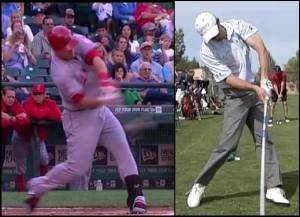
Photo courtesy of waxgolf.com
A: Well Maggie, he could be right. Golf and baseball are alike in certain ways and different other ways. Just because you play both sports doesn’t mean you are going to take your swing into the other sport. That is a little bit of a copout. I play golf and when I miss-hit it, I say that was my baseball swing. Some of the best baseball players and pitchers I know are great golfers. It all come down to talent levels. If you are able to play multiple sports and are talented enough to separate the skills, then you can do anything you want. Some of us are not that talented, me for one.
So, basically, what your golf coach should hope for is that the baseball coach says he is bringing his golf swing to the baseball field!! That would mean he is the better instructor!! Just a little humor there but more right than wrong. Have fun playing all sports. You will get better with practice. Tell your golf coach to coach better!! :) Have fun. Sam
Thanks again for the great questions. I always enjoy talking baseball with people. Send your questions to me via email at AskSam@baseballclinics.com.






Sam, I am a 14 year old and I have fallen arches. Could this effect me from being able to play in the MLB?